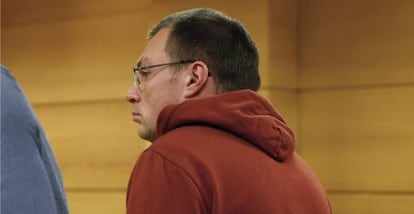Alleged cyber money-launderer says he is victim of “witch hunt”
Budovsky tells High Court extradition hearing that the US wanted to break his business

Arthur Budovsky, who is wanted in the United States on federal charges for laundering $6 billion in proceeds from different crimes through his defunct Liberty Reserve online payment processor, told the High Court on Monday that he is the victim of “a witch hunt.”
Addressing the Spanish court during his extradition hearing, Budovsky explained that the indictment brought against him by a New York grand jury last May is aimed at “destroying the competition” his internet money transfer system provided.
“I never had the knowledge that any of the company’s clients were criminals,” Budovsky said.
He explained that Liberty Reserve, which was based out of Costa Rica, was created with “a system for zero tolerance against abuse, and when there was “a suspicious” transaction authorities were immediately notified.
The company allowed users to engage in criminal transactions with an impunity that would have been impossible in the legitimate financial system"
Budovsky was arrested by Spanish authorities at Barajas International Airport on May 24, 2013, along with his financial accounts manager, the Moroccan Azzeddine El Amine, after a federal grand jury indicted them and others on money-laundering charges related to illegal cash transactions from suspected proceeds coming from different crimes, including credit card fraud, identity theft, investment fraud, computer hacking, child pornography and drug trafficking.
During a news conference last May to announce the unsealing of the indictment, US Attorney Preet Bharara for the Southern District of New York said that Liberty Reserve “quickly became a financial hub of the cyber-crime world, facilitating all manner of online crimes,” and “over time became the bank of choice for the criminal underworld.
“By providing layers of anonymity, the company allowed users to engage in criminal transactions with an impunity that would have been impossible in the legitimate financial system,” Bharara said.
The High Court will decide his fate in the coming days, but his defense team will have a chance to appeal the ruling to a higher judges’ panel. The Cabinet will have the final decision on whether to extradite Budovsky.
Reading from a letter before the court, Budovsky said that he began having problems with US authorities when in 2011 they asked him to provide them with Liberty Reserve’s source code. He said he refused because “it was like asking Coca-Cola to reveal its secret formula.”
That same year, Budovsky, a US citizen, married a Costa Rican woman and obtained her country’s nationality.
The wanted US fugitive likened his case to the recent spying scandals involving the National Security Agency. His lawyer Gonzalo Boyé even compared his client to Wikileaks founder Julian Assange and former NSA contractor Edward J. Snowden, who first blew the whistle on the US global spying network.
Budovsky and El Amine were arrested at the Madrid airport when they tried to make a transfer to a flight to Costa Rica, having arrived from Morocco.
Also arrested in the case in New York were Vladimir Kats, a co-founder of Liberty Reserve, and Mark Marmilev, who helped design and maintain Liberty Reserve’s technological infrastructure. Maxim Chukharev, who also helped manage Liberty Reserve’s technology infrastructure, was arrested in Costa Rica.
At its height, Liberty Reserve, which started in 2009, is alleged to have had more than one million users worldwide, including more than 200,000 users in the US, who conducted approximately 55 million transactions, which US authorities said were virtually all illegal.
According to the US Justice Department, it was the largest money-laundering investigation to date with the cooperation of law-enforcement authorities in 17 countries, including Costa Rica, the Netherlands, Spain, Morocco, Sweden, Switzerland, Cyprus, Australia, China, Norway, Latvia, Luxembourg, the United Kingdom, Russia, Canada and the US.
Tu suscripción se está usando en otro dispositivo
¿Quieres añadir otro usuario a tu suscripción?
Si continúas leyendo en este dispositivo, no se podrá leer en el otro.
FlechaTu suscripción se está usando en otro dispositivo y solo puedes acceder a EL PAÍS desde un dispositivo a la vez.
Si quieres compartir tu cuenta, cambia tu suscripción a la modalidad Premium, así podrás añadir otro usuario. Cada uno accederá con su propia cuenta de email, lo que os permitirá personalizar vuestra experiencia en EL PAÍS.
¿Tienes una suscripción de empresa? Accede aquí para contratar más cuentas.
En el caso de no saber quién está usando tu cuenta, te recomendamos cambiar tu contraseña aquí.
Si decides continuar compartiendo tu cuenta, este mensaje se mostrará en tu dispositivo y en el de la otra persona que está usando tu cuenta de forma indefinida, afectando a tu experiencia de lectura. Puedes consultar aquí los términos y condiciones de la suscripción digital.








































